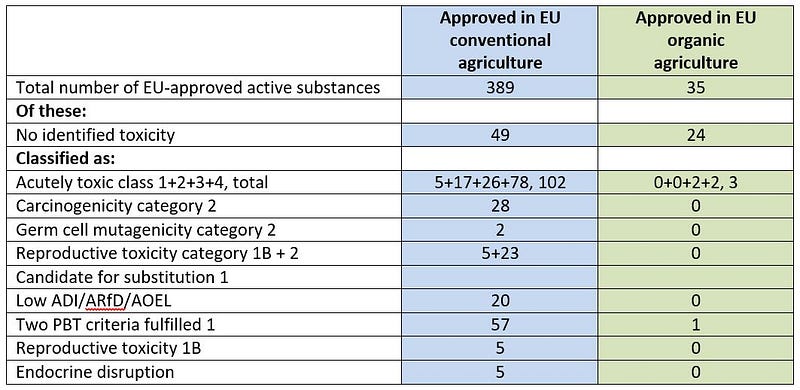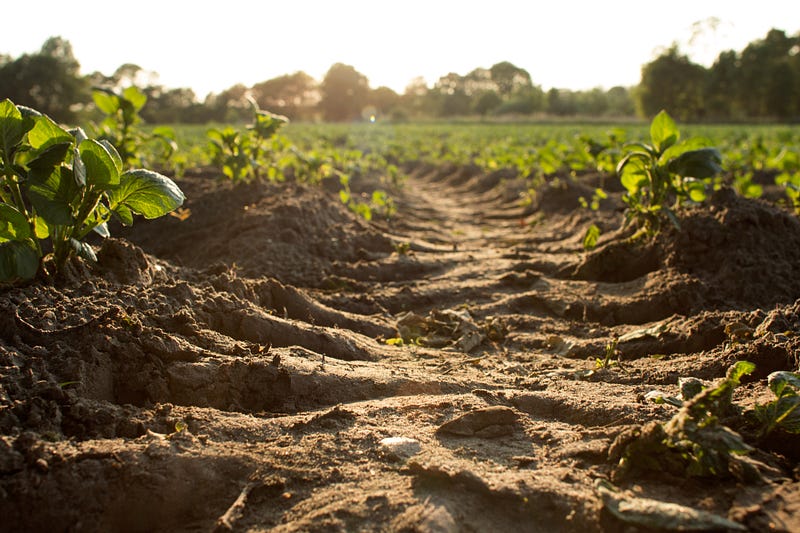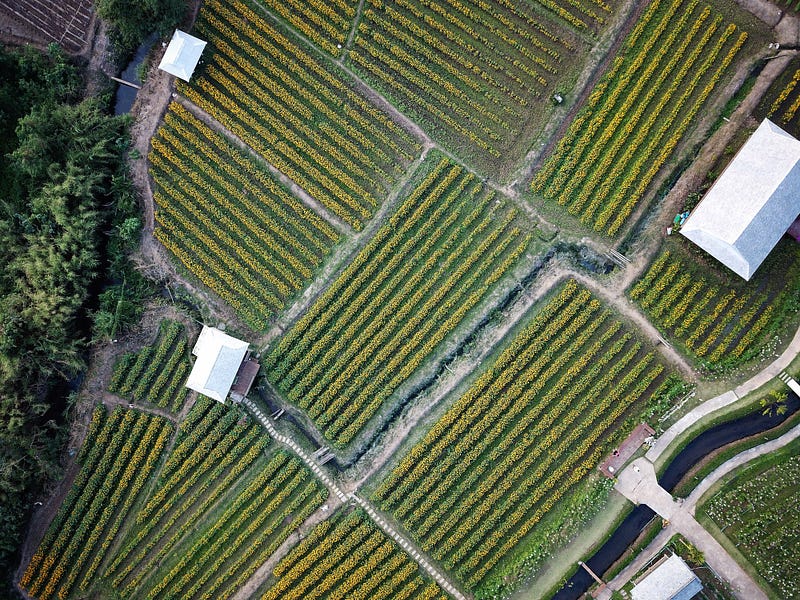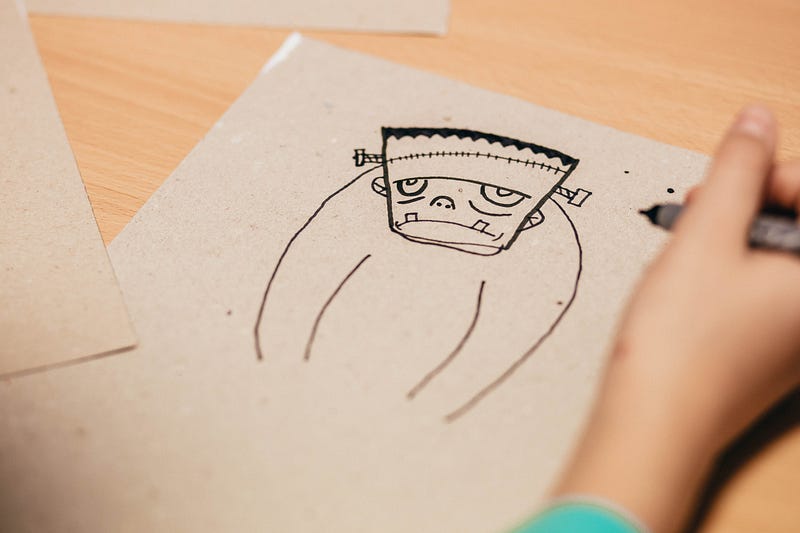
It’s a sacrifice
During this time, a friend of mine came to stay. Her funds were on the down-low too but she always ate organic food! I saw that she made sacrifices in other areas of her life to compensate for the expense of the food, like in travel and in the quality of accommodation. To her, being ‘organic’ seemed non-negotiable; something not to be questioned; A correct choice, at an intuitive level; beyond any intellectual consideration. Perhaps she was more self-assured in her values because she was brought up in the countryside so she was more authentically connected with nature? I had been beginning to waver, more tempted by the negative perspectives surrounding organic food. My friend on the other hand was forcing me to go question deeper. I had to assess the value of organic food for myself to satisfy my logical side. How much better is it for me, and for the planet? Are all organic foods equal? Can my premium food expenses be justified when money is tight?

It came to me that the the value of something can be measured by the sacrifice that we are willing to make for it. The purpose of my investigation was to make the due consideration to properly justify a sacrifice or if whether if one needed to be made at all. The answers I arrived at surprised me, and were profound in their simplicity.
Rabbit holes and rabbits
Throughout my research, I found rabbit holes in abundance, from reading arguments and conspiracies on reddit about how ‘organic’ is just a new fad to charge more for food, to Scientists in disagreement on the nutritional benefits organic food compared to non-organic food.
While researching I was aware that I also needed to be mindful to take into my account my natural bias towards Organic food and against Genetically modified foods. I consciously gave attention to both sides of the argument, plus I really wanted to know the truth about the quality of the organic food produce.
These are the points of considerations to determine whether Organic foods are ‘worth it’:
- Long term sustainability;
- Personal health;
- Addressing the immediate needs for food and its affordability.
Trust and truth and honesty
UK has a number of certifying bodies for Organic farming, they have similar standards but not exactly the same and some leave room for interpretation. Among them, the Soil association is the largest, the most stringent and trusted.
Before looking into the controversies I wanted to see if I could navigate around them to see if there were some topics that could commonly be agreed upon. There were! I began my investigation by comparing three of the certifying bodies, Soil association, Organic Farmers & Growers (OfOrganics) and Organic Food Federation.

I found that any foods labeled as “organic” in the UK ensure the public of the following:
- Artificial coloring and sweeteners are not used,
- Preservatives and herbicides are not permitted,
- Food is not genetically modified,
- Food is free-range.
It was good to be able to start with some hard truths.
Chemistry is confusing
Understanding the need for chemicals in agriculture helps us to appreciate many of the challenges in agriculture. The use of chemicals is at the heart of the argument of conventional vs organic farming. It also crosses all three criteria to help me justify the value of organic food: Health, Sustainability and Cost.
Why we need chemicals
Producing food on a large scale means to meeting the high demands and like clockwork while trying to normalize market prices. Chemicals help to make the industry of food more predictable by mitigating risks from bad weather, disease and pests.

Chemical free? Not exactly.
This is where most people get mistaken; Organic food means to significantly reduce use of chemicals, opting for preventative measures and use of natural chemicals in favor of synthetic chemicals, but it rarely mean zero chemicals.
- Antibiotics
The Soil association advertises, “Organic farming encourages wildlife and cuts the use of pesticides and antibiotics”.
The term ‘cuts’ is a little vague. It was not the only ambiguous term I came across when looking at their website and their regulations, for instance, “stopping routine use of antibiotics”. The word ‘routine’ does not quantify how much antibiotic is allowed to be used, or under which circumstances. The Soil association by all accounts are regarded to be a reputable regulatory body and I did not find anything contrary to their reputation. Learning more about the problems that the agricultural industry face, I could see that it just would not be practical to be too stringent with rules. Organic farmers sometimes are going to face severe and unpredictable problems that are going to require some compromise with regards to best practices. Without slack, then as a business they are not going to be sustainable and they will fail to meet demand.
I was encouraged to learn that the Soil association run regular checks on the farms that they certify. Including tests like taking soil samples insuring that the farms are operating within regulation; They consistently require farmers to justify the use of antibiotics.
- Herbicides
The Soil association are an absolute “No” to herbicides. The Organic federation are less clear about weed control methods, stating, “You must not use traditional herbicides and methods.”. While OfOrganics are positively clear, declaring, “The use of all herbicides, including traditional materials such as diesel, plant oils and salt solutions is prohibited”.
- Pesticides
The Soil association state that conventional farming allows for up to 320 pesticides, while organic farming use only 15 and they are made from natural ingredients. Certifying bodies, Organic federation and OfOrganics allow for approx the same number of pesticides and also require them to be from organic sources.
The charity Pesticide Action Network (PAN) UK are an independent body that aims to reduce the use of pesticides while providing independent information on pesticide use. The informative diagram from PAN provides an overview of harmful effects of pesticides comparing conventional and organic farming:

Out of the 35 pesticides that are permitted in organic farming only two are identified as a potential for toxicological concern. For some, it seems to be intolerable but I can see the practical value of the compromise, at least for now. In the meantime PAN are working on solutions to negate the need for those pesticides too.
PAN report that some synthetic pesticides are permitted but not directly on soil or plants.
Chemicals get a bad rap
Sometimes we find a perception that chemicals are bad in of themselves, but chemicals are of course everywhere and are the building blocks of life! An organic chemical does not necessarily mean that it will be less toxic, and in some cases synthetic chemicals can be better. Scientific America addresses this gray area in their article, “Natural versus Synthetic Chemicals Is a Gray Matter”.
Organic farming in the ideal scenario is working in harmony with the natural environment and utilizing practices so to create and maintain the conditions for required chemicals to naturally occur as opposed to having to introduce them artificially.
The problems come when we artificially introduce new and excessive quantities of chemicals into an environment. Then it becomes increasingly difficult to find a natural equilibrium and counter-productive to sustainable farming.
Today vs Tomorrow | Sustainability
Sustainable agriculture is, “meeting society’s food needs in the present without compromising the ability of future generations to meet their own needs”, as defined in Wikipedia.
I thought my findings would be all in favor of organic farming but surprisingly there are negatives, and some uglies!
Positives

Less pollution: Cutting back on all the herbicides and reducing many of the other chemicals means less pollution in our lands and water. Chemicals contribute to soil erosion and groundwater contamination. Both of which contribute to poor soil structure leading to deteriorating farming conditions for the future.
Agriculture: Organic farming considers the long term sustainability of the land, building practices including: crop rotations, inter-cropping, symbiotic associations, cover crops, organic fertilizers and minimum tillage. Furthermore by cutting back on all the herbicides and reducing many of the other chemicals means less pollution in our lands and water. Chemicals contribute to soil erosion and groundwater contamination. Both of which contribute to poor soil structure leading to deteriorating farming conditions for the future.
Climate change: TheInternational Agricultural Research(CGIAR) tell us that third of all human caused greenhouse emissions come from agriculture. Organic farming, according to the Soil association, can significantly reduce emissions through a process soil carbon sequestration whereby carbon is locked into the soil, “In the UK, our soils hold an estimated 9.8 billion tonnes of carbon, making them an essential resource in reducing our greenhouse gas emissions and tackling climate change”. Unite Nations Foundation tell us that this can provide one third of the climate change mitigation required!
Biodiversity: One immutable truth of organic farming is that it has a positive effect on biodiversity. Biodiversity is the variety of all life on this earth including, plants, microorganisms in soil and animals. The United Nations tell us about its role in sustainability, “Without biological diversity, there is no other life on Earth, including our own. Even though we are often oblivious to it, this diversity of life is what provides clean water, oxygen, and all other things that end up being part of our diet, as well as clothing and shelter”. Organic farming helps by significantly reducing harmful chemicals and choosing farming methods that promote diverse species to thrive such as crop rotation.
Negatives
Land and yield: Organic farming results in smaller yields, thereby requiring more land to grow the same quantity as conventional farming. The amount of additional space required puts into question whether food from organic farming methods could sustain a population of 7 billion.
Note: We should also take into account that it is the required additional space that helps for successful ecosystems to emerge which leads to conditions from improving biodiversity and fighting climate change.
Footprint: I was happy to find out that UK is Europes’ biggest consumers of organic food but then equally disappointed to realize that the UK only has 3% of farmlands reserved for organic farming which means we import a lot, this results in increasing our carbon footprint.

Cost: Organic prices are so high that it excludes a lot of people from even being able to make a choice to be pro-organic.
Short shelf-life: Organic food goes off quite a bit sooner, I’m old enough to know this it used be norm back in the day. In today’s fast paced world it creates practical challenges for the consumer to try to consume the food while it’s still good.. Equally this poses a challenge for businesses, and is also related to the cost of the produce. Businesses including farms, distributors, delivery networks, shops are under stress to get food from farm to fork while maintaining it’s freshness.
High risk: The more organic we are then the more risk to the supply meeting demand, at every level, from farming to supply chain and the journey to the plate.
Personal Health
Pesticides and chemicals
Reducing unwanted chemicals from our food seem to be one of the major reasons that motivate people to want to buy Organic food. It’s important for me too but it was not until this investigation that I appreciated how detrimental these chemicals can be to our health. Sourced from Pesticide Action Network (PAN). Health concerns include:
- Acute toxicity, when symptoms are usually known within 48 hours, and they can include: Allergic reactions, Irritations, Nausea, Headache and Weakness.
- Chronic toxicity: Sometimes effects are instead felt over a long period of time and can be linked to Parkinsons disease, Asthma, Depression, Anxiety, ADHD, Cancer, and more!
- Endocrine disruptors: Interfering with the the chemical messengers of the body, can particularly affect growth and reproductive systems.
- Carcinogenic substances: Even low does can potentially lead to cancer!
- Cocktail effect: The combined affect of the above on our bodies is unpredictable.
Genetic modification of food and the natural world
This is a topic that is both emotive and highly polarized. Interestingly, there is a lot more content in support of GM foods compared to say 10 years ago and with more backing from scientists. Also interestingly, there is a lot of investment pouring into the GM technologies as well as significant advancements in the technology, like taking genes from completely different species e.g. animal genes into plant genes . In the US where GM is more prevalent compared to the UK, 92% of corn is GM, and up to 75% of processed food is GM according to Center for Food Safety.
Advocates of GM tech suggest that GM foods are going to save us from the inevitable and looming food crisis and protect us from the harms of pesticides. While on the other side we are told that we are irreparably damaging ourselves and the earth and that it will lead to untold and detrimental consequences.
The topic of GM food more than any other compels me to question our relationship with the natural world. So instead of looking at the two sides of the argument, much of which seem biased anyway, I have instead opted to explore my own concerns towards GM foods so that it might lead to deeper understanding of the underlying problems.

Many questions and no game plan
What is exactly the problem that we are trying to solve with GM foods? Is it just that we failed to integrate with our habitat? Are we now forever destined to keep trying to control our environment? Is there intention or incentive enough to ever try to return to a harmonic relationship with nature, or are we hereon destined to diverge from nature?
Unnatural economy
We are told that GM foods are going to solve the food crisis but what is the reason for the food crisis? Is the earth not capable of providing enough food for the increasing population? Perhaps we would do better to invest energy in curtailing population. Though this solution would be out of alignment with driving factors of our implementation of capitalism which requires population to continue to grow. Furthermore, as Karl Marx pointed out, “core requirement of a capitalist society is that a large portion of the population must not possess sources of self-sustenance that would allow them to be independent and are instead forced to sell their labor for a wage”. This is an unnatural requirement on people and one that would inherently put us at odds with the natural world. In which case technology like genetic modification seems to me more like a product of our capitalism rather than a stop-gap solution on our way re-aligning ourselves with our natural environment.
Chaos theory

The primary concern for me when it comes to GM foods is the one that Jeff Goldblum represents in Jurassic park, Chaos theory. Small changes in complex systems can have vast and unpredictable consequences, like the butterfly flapping its wings creating hurricanes. It seems to me that the scientific community fail to predict even comparatively simple things and unashamedly make complete u-turns on findings that were presented as certainties. For example, a food can go from being declared as dangerous, even carcinogenic and then later back to being heralded as a superfood again! Examples at this link. I am still confused by soy products. Are they healthy or are they going to grow breasts on me?!
Perhaps it was the story of the Cane toads that my geography teacher told our class back in senior school that left this lasting impression on me about the dangers of playing God. The Cane toads were introduced into Australia from South America to control the beetle population but quickly proved to be a huge ecological disaster as they became out of control, multiplying fast and destroying the balance of the flora and fauna as they spread through Australia. Furthermore they failed to reduce the beetle population! Full story at this link. Moral of the story being to be careful when upsetting the balance of complex systems. I mean no one has so far been able to tell us what is causing the crumbling population of bees! Are the scientists really ready to convince us about the safety of GM tech?
Is it safe?
The question of safety of GM Food is a broad area, much of the existing discussions center around measuring the direct impact on the health of people after consuming GM foods. The testing seems thorough and not much has been found to be dangerous, at least not in the short term. But what about other safety concerns and indirect dangers:
- Safety to our ecology. Humans may not be at risk from GM foods but about other animals and insects and then how they go on to impact the eco-system;
- Contamination of non-gm crops through a process called ‘gene flow’ is regarded to be one of the biggest dangers according to ecologists. Read more in this National geographic article.
- Decreasing bio-diversity: GM foods are not unlikely to foster bio-diversity, we will simply be creating more of what works. Nature on the other hand is really good at variety. I recently found out that most of our bananas were cloned sourced from a single banana known as the Cavendish banana by taking its cutting. Problem is that it is intensely vulnerable to disease putting the market and supply at high risk. Nature does not put all its eggs in one basket!
- Economic sovereignty, are we opening ourselves to risk where seeds of the future are not longer created by nature and we become dependent on corporations instead?
More information on safety of GM foods can be found at the World Health Organisation.
If it looks like cancer and behaves like cancer …
If we accept that it’s our failure to harmonize with nature as the primary problem then the next question would be — Why? Are we over-competitive as a species that renders us incapable of solving problems at a global scale?; Is our economic and political behaviors are to blame?; Have we become disconnected from nature because of an inherent fear and mistrust of it?; Perhaps as a species we are nihilistic at our core and so unconsciously we seek to ever-distract ourselves while we fail to envision or aspire to towards a harmonious future. Or perhaps it is simply because our technology is advancing faster than our wisdom?
It would be simple if there was no other conceivable solution to increase food before running an experiment in nature at such scale and risk. It seems that solutions like Reducing the eating of meat; Curtailing population; Encouraging people to grow more at home; seem to be off the table or at least not economically viable. In short, it’s difficult to measure the validity of a solution when it’s not clear enough what the problem is in the first place (as far as I have been able to tell!).
Nutrition
Results for nutrition of GM foods compared to Organic foods are not conclusive but so far there has not been evidence to show that GM foods are any less nutritious.
So, Is organic food worth it?
I started this research into organic foods at a time in my life when I had to be able to justify their expense . While looking into the food and environment issues with more scrutiny I connected even more deeply with my own personal sense of responsibility for the crises that are unfolding against nature. The arguments were complex and multidimensional. However, no matter how complex things seem they can always be simplified I mean look at e=mc2, and Ghandi, who suggested that we should become the change we want to see in the world. There was no point blaming anyone else, politicians, corporations, scientists. In the end we each have to act to the best of our own ability.
Think globally and act locally, I have affirmed to myself. I decided that supporting the Organic food industry is a valuable and meaningful pursuit for me, and for which I would be prepared to make sacrifices. It is a privilege to be in a position to even be able have that choice even though it may be difficult at times.
It is a shame that organic food can not be a choice for everyone because of the cost, but this does not have to be looked upon as a negative elitist thing. With each vote a consumer makes for Organic, demand and supply increases, and in the long run it will reduce prices for everyone. Organic foods is certainly something we need to get behind, the single most positive and inclusive thing we can all do is to grow at home.
I also found that I need not have a binary opinion on the alternatives to organic farming, good/bad, yes/no, right/wrong. Solutions can be part of a spectrum. Conventional farming is providing quantity, but at the cost of soil erosion, poisoning of food, rivers etc. GM foods significantly reduce the problems of conventional farming but at the cost to biodiversity and who knows what else.
While I can be open to all solutions what I do feel is missing is a shared and positive vision for the future. The undeclared vision that I currently see is one where we become increasingly dependent on corporations to meet our basic of needs. Perhaps genetic modifications will one day lead to great things, more likely when we come to understand and respect our relationship with nature better. Right now it seems to me there is not a clear game plan other than panicked problems solving and corporation interests.
References
- Climate change food calculator: What’s your diet’s carbon footprint?
- What is organic food and what does organic mean
- Is organic food actually better? Here’s what the science says
- 17 Reasons to buy certified organic food.
- Pesticide Action Network (PAN)
- List of active substances approved for use in EU organic agriculture under EU Regulation (EC) No 889/2008
- Soil Association
- Organic Farmers & Growers
- Organic Food Federation
- Food.gov.uk: Food additives
- United Nations Foundation
- Natural versus Synthetic Chemicals Is a Gray Matter
- https://www.newscientist.com/article/dn27199-cane-toad-has-surprise-effect-on-australian-ecosystem/
- https://ourworldindata.org/is-organic-agriculture-better-for-the-environment
- https://www.nationalgeographic.com/animals/amphibians/c/cane-toad/
- http://www.critical-theory.com/environmentalist-capitalism/
- https://en.wikipedia.org/wiki/Capitalism
- https://www.theguardian.com/lifeandstyle/2014/mar/23/everything-you-know-about-unhealthy-foods-is-wrong
- https://www.nytimes.com/2018/04/23/well/eat/are-gmo-foods-safe.html
- https://www.who.int/foodsafety/areas_work/food-technology/faq-genetically-modified-food/en/
- http://www.centerforfoodsafety.org/issues/311/ge-foods/about-ge-foods
- https://www.theguardian.com/environment/2013/feb/12/monsanto-sues-farmers-seed-patents
- https://responsibletechnology.org/docs/GMO-Myths-and-Truths-edition2.pdf
